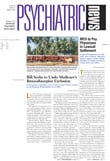The impact of a psychiatrist's personal life on his or her practice, the decision to disclose a personal tragedy to a patient, and the isolation psychiatrists experience were some of the themes raised in an illuminating and personal discussion by psychiatrists after viewing “The Son's Room” at the American Psychiatric Foundation's first Psychiatry Film Fest. The event was held in Atlanta during APA's 2005 annual meeting in May.
This slow-paced, character-driven film in Italian with English subtitles won best picture in the 2001 Cannes Film Festival. It explores the life of a psychiatrist, Giovanni, and his family after the tragic death of their teenaged son in a diving accident.
During the 45-minute discussion after the film's viewing, moderated by Steven Hyler, M.D., attendees shared a variety of perspectives. The experience of the psychiatrist's grief and how he copes with his loss, as well as“ the burden of living with what our patients share,” as one audience member put it, resonated with the audience.
As the film unfolds, viewers learn that Giovanni is tormented by the thought that he might have prevented his son's death had he spent time with him instead of responding to a patient's crisis. These events impact the doctor-patient relationship, raising the issue of personal disclosure to the patient and whether it is an appropriate component of therapy. Audience members weighed in, advocating both for and against self-disclosure.
Giovanni returns to work almost immediately following the tragedy, a decision that led the audience to question the ethics of returning to work so quickly, what is an appropriate length of leave, and how to do so, as well as to comment on the need for psychiatrists to accept that they need to take time for themselves during a crisis. Many in the audience identified with Giovanni and his inability to recognize his own need for time to grieve.
“As an organization focused on awareness of mental illnesses, we recognize that the public's perception of mental illnesses, treatment, and psychiatry is shaped by popular culture, which often means portrayals in film and television,” said Jackie Feldman, M.D., a member of the foundation board and Psychiatry Film Fest host.
“By bringing a high-quality film to the annual meeting, the foundation acknowledges the work of a filmmaker who raised rather than lowered the bar with regard to the public's understanding of mental health.”▪
